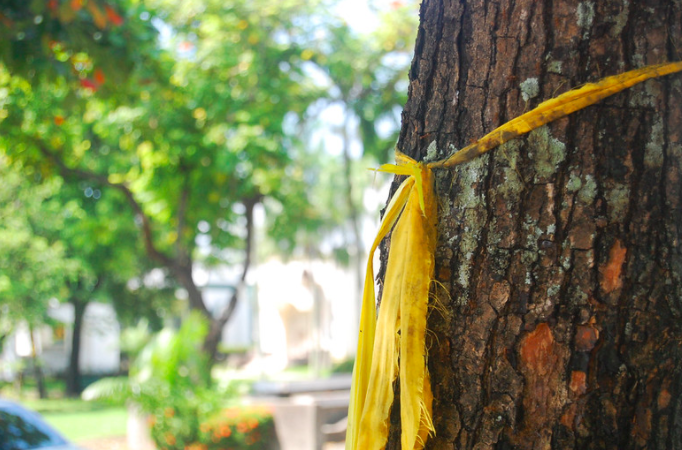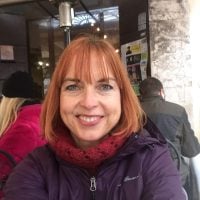*Editor’s Note: Elephant Journal articles represent the personal views of the authors, and can not possibly reflect Elephant Journal as a whole. Disagree with an Op-Ed or opinion? We’re happy to share your experience here.
Please check your government’s website for current coronavirus live updates. And follow the CDC guidelines here.
~
Elephant’s Continually updated Coronavirus Diary. ~ Waylon
~
I just can’t keep silent anymore.
The adrenaline running in my body for days and the chill that settled in my bones since hearing an audio message from a friend in Rome, where I lived for many years, just won’t let me keep silent.
She said she’s concerned about rumors of the “medical martial law” that’s been in place and of the recent banning of some scientists and other voices who have raised questions about the official coverage of the COVID-19 crisis and the total shutdown in Italy and worldwide.
I had already been feeling pressure, wrangling with the big question: to voice or not to voice? Was it better to keep all the questions that I’ve been sitting with for weeks to myself? Would it be a disservice to others to raise questions and share my anxieties in a time when people are already grappling with fear and uncertainty?
Part of the anxiety I’m speaking to is this feeling that I have to censor myself: censor my questions, my concerns about what this world lockdown portends for democracy and civil liberties. What it portends for the mass uprisings against dictatorship and social injustice in Chile that had been going on since October, and the worldwide solidarity and women’s movements it catalyzed in the months before the pandemic.
But in the light of pandemic, shouldn’t democratic rights, civil liberties be secondary? The question hangs in the air.
So, maybe better to squelch those concerns. And my apprehensions about what it means for the millions of Americans who have no safety net at all, and were one paycheck away from poverty, pre-pandemic.
Better not to think about those things yet. We have a crisis to solve, says my mind.
My fears of sharing my voice got exacerbated over a week ago when someone cried “anti-scientific” in response to some information that was going around, which suggested some common sense and practical tips around virus protection and ways to boost the immune system. Why anti-scientific? Because doctors hadn’t proven the immune-boosting qualities.
And, let’s be real: what’s the point of challenging something that we feel powerless to change anyway?
So, is the stage set for silencing voices that critique the official narratives of our time? Many have found health and healing through medical paradigms beyond the current allopathic one that predominates now. Like homeopathy.
The above perspectives might sound like heresy to most. Because none of us have been exposed to them; competing models are often marginalized and dismissed as “anti-scientific.” (I won’t speculate here whether this has anything to do with the power of the global pharmaceutical market, which, as of 2018, was valued at about 1.2 trillion United States’ dollars.)
The truth is, I am not interested in arguing for the perspectives. I am interested, however, in taking a stand for the freedom to question; for being able to have access to different perspectives that may go against the grain.
After all, where would we be now without those great figures in history who challenged the official narratives of their time, like Galileo and Copernicus, to name the most obvious (in Western culture, anyway)? What about the suffragettes, the abolitionists, and Margaret Sanger? And aren’t we glad that there were voices that challenged the once-dominant beliefs that women didn’t have souls, or were subject to men?
Of course, I’m no great scientist, philosopher, or “expert.” So isn’t it better to squelch the questions rolling around in me like: why this reaction—this global lockdown now? Why did we not do the same when SARS emerged? Why didn’t we hear about the 80,000 Americans who died of flu in 2018?
I tried to shelve the questions as I saw articles and social media posts urging all to “get on board” and imploring others to not voice any opinions on the current pandemic, unless they were public health experts. And, to part of me, that sounded reasonable. After all, misinformation could be deadly amidst a pandemic.
But then it begs the question: do any of us have the right to proffer opinions about things in which we are not expert? By that logic, perhaps I should not, as an average voter, without any expertise in city planning, or the prison systems, or the education system, be offered the chance to vote on local or state-wide initiatives concerning such matters.
In the same vein, did one have to be a political scientist or military strategist back in the early 80s to question the United States nuclear policy of M.A.D (Mutually Assured Destruction)? In that era, I was a mere preteen with a gut instinct that said, “this is insanity.” Arriving at that opinion required only an awareness of belonging to a single human race.
Sometimes truth is visceral, coming from the gut in the form of an “uh-uh” or “uh-huh.”
So rather than risk backlash for raising potentially disconcerting concerns or divergent perspectives, I’ve sat on it all. I threw myself into articles encouraging people to focus on all the positives, on the silver linings. I attempted to envision what I want for our future, rather than what I fear. I vowed to focus on love, and to use this time as an opportunity to transmute my own demons and shadows, rather than worrying about the external ones.
But here’s the problem: love, light, and silver linings are not my whole truth. I’d go to bed convinced that keeping silent is of greater service. But then I’d wake up with that heaviness in my gut. The heaviness of something felt but unspoken.
I had to face the fact that I’m a coward. I’ve held back because I don’t want to be unpopular or labeled “conspiracy theorist” if I raise questions or challenge the status quo. (Though I think this term is often bandied about as an easy way to delegitimize perspectives not sanctioned by the status quo, or mainstream media.)
And here’s the thing: while I’m not a conspiracy theorist, I am a woman who has been driven by curiosity in my life. A woman who has questioned a lot. And, having lived 20 years outside the American bubble in several different countries, I’ve been exposed to many different perspectives and worldviews. And it’s enriched my life immensely.
As a young woman, I studied International Relations and entered university with much idealism and even dared to think of becoming an ambassador. But then I took International Relations 101. I read my United States foreign policy. I learned about the lies that were told to the American public, to the world, for the sake of furthering corporate interests, power, and profit. There was the overthrow of Allende in Chile. There was the Gulf of Tonkin (the lie that led to the Gulf of Tonkin Resolution and Johnson’s legal justification for deploying United States forces for war against North Vietnam). There was Central America and the Iran-Contra Affair. In more recent history, there was the false claim by the United States administration of weapons of mass destruction Iraq that justified United States bombing. And then there was my own eye-witnessing of censorship as a student activist in 1991.
So maybe the knots I feel in my stomach are remnants of this past memory; a time during those three months of that first Gulf War. It was a time in which those of us advocating for peace saw over and over again the discrepancies reported in the media; broadcasts grossly underreported the numbers of those attending rallies to stop the war, while inflating the numbers of “pro-war” demonstrators.
It’s one thing to read about censorship and disinformation in the history books, but quite another to witness it firsthand.
And then, in the days that followed, those in disagreement with the war were labeled as anti-American or “anti-troop” and everyone on both sides rushed to brandish yellow ribbons to prove their allegiance to the troops, to America.
And now I have that similar feeling: that I have to brandish a yellow ribbon to prove my allegiance to humanity in this time of COVID-19. But the form of yellow ribbon is silencing any doubts and concerns that stray beyond the sanctioned discourse of public health safety.
Isn’t it interesting that as we grow up and mature in life, we learn that it is healthy to question? An essential part of our development? By our late 20s, or at least midlife, we have come to look with new eyes upon our childhood narrative—who we believed ourselves to be; who we believed our parents to be. And yet, at a societal level, at a national level, this is deeply frowned upon.
But I believe that it is our uncontested narratives that have led us to the perils facing our planet today. I am convinced that it will be the challengers of our official narratives that will bring us closer to the solutions we need to save our humanity.
Now, excuse me while I go buy a yellow ribbon.
~
Relephant:











Read 34 comments and reply